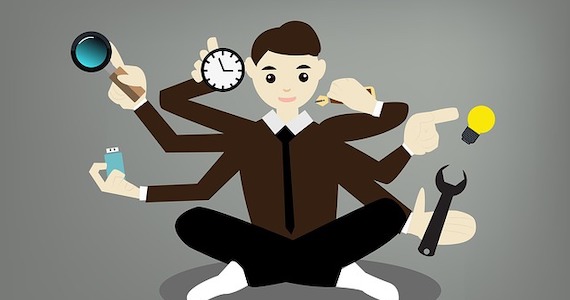By Lucinda Lions, Flying Solo contributor
Think you’re great at multitasking? So did these people, until studies revealed some unsettling data.
On three different occasions over the years, something terrible has nearly happened to me as a result of multitasking.

I work from home, and if my home-office door is closed, my partner and son rarely disturb me. But sometimes they need to ask a quick question or tell me something important. When they do, I usually stop what I’m doing, listen, speak, and get back to work once they leave. But on a few occasions I’ve kept tapping away at emails while they talk.
The problem is, on each occasion where I’ve split my focus, at the end of every email, I’ve typed, ‘I love you’.
Yes, I love you.
“When you struggle to pay attention, make mistakes, forget information and switch ineffectively from task to task, it will invariably lead to poor performance.”
One time it was to a complete stranger who simply wanted a copywriting quote, but who could’ve ended up with so much more.
Thankfully, each time I immediately realised my mistake and frantically deleted the offending sentence, promising never to multitask like that again.
Studies say multitasking sucks
Deep down, most of us realise that doing two or more tasks at once is ineffective and many studies prove this.
Still, some select individuals seem to be particularly gifted in the art of multitasking, particularly media multitasking, which involves flitting between social media and emails, or messenger apps and websites, or text messages and YouTube; or a combination of several.
So Stanford researchers decided to conduct a study to find out exactly how and why they’ve become so good at media multitasking.
The studies told a curious story
Clifford Nass, Eyal Ophir and Anthony Wagner put 100 students through their paces in an effort to find out what gave the gifted media multitaskers their juggling edge.
For each test, the researchers split the students into two groups. One group regularly multitasked, while the others didn’t.
The first test involved flashing up configurations of images, and asking the participants questions about those configurations. The participants were also asked to ignore such things as random, blue rectangles that would appear near the configurations. The low multitaskers ignored them just fine, but the high multitaskers were constantly distracted. Their performance in that test was considered quite poor.
Not perturbed, the researchers assumed that because the high multitaskers couldn’t ignore distractions, they must have sharper memories, allowing them to better store and organise information.
Wrong.
In the second test, the participants were shown a series of alphabetical letters. The high multitaskers performed poorly again, not remembering when a letter was repeated.
‘The low multitaskers did great,’ Ophir said. ‘The high multitaskers were doing worse and worse the further they went along because they kept seeing more letters and had difficulty keeping them sorted in their brains.’
The researchers figured that if the high-multitaskers couldn’t filter out irrelevant information or organise their memories, they’d have to be better at switching effectively from one task to another.
Nope!
The third test involved the participants seeing simultaneous images of letters and numbers, and having to focus on one or the other. When looking at the digits, they were asked to determine whether they were odd or even. When looking at the letters, they were asked to determine whether they were vowels or consonants.
Again, the light multitaskers performed better. Ophir said of the high multitaskers: ‘They couldn’t help thinking about the task they weren’t doing. The high multitaskers are always drawing from all the information in front of them. They can’t keep things separate in their minds.’
If that isn’t bad enough, Wagner went on to explain one of the reasons why they performed the tasks slower: ‘When they’re in situations where there are multiple sources of information coming from the external world or emerging out of memory, they’re not able to filter out what’s not relevant to their current goal. That failure to filter means they’re slowed down by that irrelevant information.’
Poor performance. A lack of productivity.
A different study showed that when participants were asked to do three tasks, it led to three times the rate of errors, than when completing two.
All this data paints a worrying picture. When you struggle to pay attention, make mistakes, forget information and switch ineffectively from task to task, it will invariably lead to poor performance and a lack of productivity.
Does multitasking also damage your thinking?
While researchers are convinced that the minds of multitaskers aren’t working as effectively as they could, they’re still researching whether chronic media multitaskers are born with poor concentration, or if multitasking is actually damaging their cognitive control.
Some articles cite research that suggests multitasking actually lowers your IQ. This particular article reads: ‘A study at the University of London found that participants who multitasked during cognitive tasks experienced IQ score declines that were similar to what they’d expect if they had smoked marijuana or stayed up all night. IQ drops of 15 points for multitasking men lowered their scores to the average range of an 8-year-old child.’
Yikes!
Studies say it sucks. But so does common sense.
The reality is, for every study that proves multitasking sucks, there’s probably one that proves it increases your output while reducing fine lines around your eyes. So forget studies and let’s consider common sense.
Can doing two tasks at once (tasks that require deep thinking or attention), really be more effective than giving 100% attention to one task at a time?
Honestly, my gut says no.
Light multitasking has its place, and most of us do it at home and work. But if heavy multitasking becomes your constant, go-to way of existence, particularly in the area of media multitasking, you could be paying a big mental and productivity price. So boost performance and productivity by focusing on a single task. You’ll do it better, faster and with far less mistakes.
I love you.
Source:
This article by Lucinda Lyons is reproduced with the permission of Flying Solo – Australia’s micro business community
Find out more and join over 100k others.
Important:
This provides general information and hasn’t taken your circumstances into account. It’s important to consider your particular circumstances before deciding what’s right for you. Any information provided by the author detailed above is separate and external to our business and our Licensee. Any information provided by the author detailed above is separate and external to our business and our Licensee. Neither our business, nor our Licensee take any responsibility for any action or any service provided by the author.
Any links have been provided with permission for information purposes only and will take you to external websites, which are not connected to our company in any way. Note: Our company does not endorse and is not responsible for the accuracy of the contents/information contained within the linked site(s) accessible from this page.




